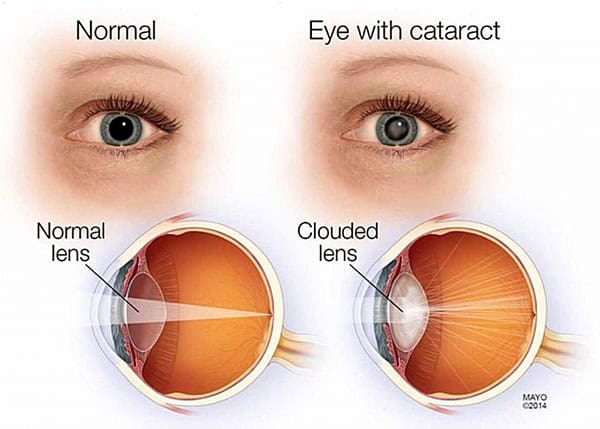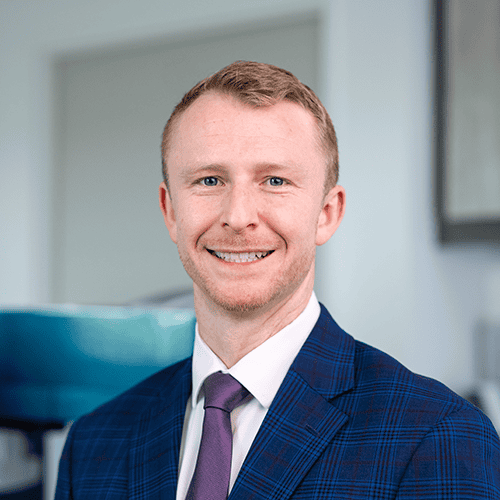Eye Care Services
Cataract Surgery
Cataract surgery involves removing the eye’s clouded lens and replacing it with a clear, artificial lens and is performed today under local anesthesia as outpatient surgery.
See Clearly and Live Fully with Cataract Surgery
Cataract surgery can transform your quality of life. Patients often notice immediate improvements in color, clarity, and comfort, along with renewed confidence in daily activities.
Key benefits include:
- Sharper and brighter vision
- Reduced glare and halos
- Enhanced depth perception
- Reduced eye fatigue
- Improved night driving and reading ability
- Quick recovery with minimal downtime
- Greater independence in daily activities
At Cool Springs Surgical Associates, our experienced cataract surgeons offer both traditional and laser cataract surgery to help you see clearly and comfortably again.

Traditional or Laser Cataract Surgery
At Cool Springs Surgical Associates, patients can choose between traditional and laser-assisted cataract surgery. Both techniques safely remove the cloudy lens and replace it with a clear artificial lens, restoring sharp vision. Laser cataract surgery offers enhanced precision and customization, while traditional methods remain a trusted and effective option for many patients.
Traditional Cataract Surgery
Traditional cataract surgery is a safe, effective procedure where the surgeon manually creates a small incision in the eye, removes the cloudy lens using ultrasound (phacoemulsification), and replaces it with an artificial intraocular lens (IOL). It is one of the most common surgeries worldwide and is typically covered by insurance-minus any copay or deductible you may owe based on your insurance plan.
Laser-assisted cataract surgery (LenSx)
Laser-assisted cataract surgery (LenSx) uses advanced imaging and a femtosecond laser to perform key steps with enhanced precision. The laser can create more accurate incisions, soften the cataract for easier removal, and allow for better customization—especially for patients with astigmatism or those choosing premium lenses. While it may offer quicker recovery and improved visual outcomes in some cases, it is more expensive and is not covered by any insurance. Your ophthalmologist will help you decide which option best suits your eyes and lifestyle.

What to Expect
Before Cataract Surgery
Before your procedure, our team will perform a detailed eye exam to evaluate your vision, discuss your lens options, and ensure you’re fully prepared for surgery.
During Cataract Surgery
It’s natural to feel a little nervous before eye surgery, but most patients are pleasantly surprised by how simple and comfortable the experience is:
- Surgery is performed on one eye at a time, usually on separate days.
- Numbing eye drops are used to ensure you don’t feel any pain.
- Light sedation keeps you relaxed (many patients even nap during the procedure!)
- Our anesthesia team carefully monitors your comfort and vital signs throughout the procedure.
- The entire visit typically takes about 90 minutes from check-in to check-out.
- Most patients are ready to go home within 10 minutes after surgery.
After Cataract Surgery
Afterward, your vision may be slightly blurry for a short time, but most people notice improvement within a day or two and quickly return to normal activities. In fact, more than 98% of patients experience a significant enhancement in vision following cataract surgery.
Understanding Cataracts
What is a cataract?
A cataract is the clouding of the lens in the eye which leads to a decrease in vision that cannot be corrected with glasses, contact lenses or corneal refractive surgery such as LASIK. Currently there is no medical treatment to reverse or prevent the development of cataracts. Once they form, the only way to achieve clear vision again is through cataract surgery.
Cataract Symptoms
Often a cataract will not significantly affect your vision in its early stages, but as it enlarges you may notice any or all of the following:
- Vision may appear blurry or hazy
- Colors may seem faded and less vibrant
- You may notice difficulty seeing due to glare or halos around lights
- Sensitivity to bright lights
- You can develop poor night vision – making it difficult to drive safely at night
- Double vision
- Reading becomes difficult even while wearing glasses

Meet Our Cataract Surgeons
Our board-certified ophthalmologists specialize in cataract diagnosis and surgical care. With decades of combined experience, our Nashville cataract surgeons have performed thousands of successful cataract procedures using both traditional and laser-assisted techniques. Their expertise, precision, and commitment to the highest standards of care make Cool Springs Surgical Associates a trusted destination for patients seeking clearer vision and renewed confidence.
Is Cataract Surgery Right for You?
If you’re experiencing blurred or cloudy vision that affects your daily life, cataract surgery may be the best way to restore clarity and confidence. Our specialists can evaluate your eyes, discuss your vision goals, and determine whether now is the right time for surgery. Schedule a consultation with Cool Springs Surgical Associates to take the first step toward sharper, brighter vision and a better quality of life.
Want to know more?
Frequently asked questions
These are some of the frequently asked questions we are asked by patients about cataract surgery.
Is surgery the only effective treatment option for cataracts?
Yes, surgery is the only effective treatment for cataracts. Cataracts permanently damage the natural lens, making surgically replacing it with an artificial lens the only way to restore a patient’s vision. There are no known medications or supplements that will prevent or cure cataracts.
Is cataract surgery major surgery?
It is surgery, but it’s not considered “major” by the medical community. In most instances, cataract surgery is an outpatient procedure.
Does cataract surgery hurt?
Generally, no, cataract surgery does not hurt. In addition to medication to relax you before your surgery, the anesthetist will numb your eye with anesthetic eye medication prior to the procedure.
What will my vision be like after cataract surgery?
That depends on several factors: the size of the cataract, your overall medical health, and the health of the eye. Most individuals see better within 24 hours and sight will get progressively better within a week following surgery.
Can cataract surgery eliminate the need for glasses?
After cataract surgery, some patients still need glasses—depending on the type of surgery and the lens implant they choose. Some lenses are designed to reduce your need for glasses, especially for distance, reading, or both, while others may still require you to wear glasses for certain tasks.
You and your doctor will discuss your lifestyle, vision goals, and all available options to help choose the lens and surgical approach that’s best for you and your eyes. Together, you’ll make a decision that supports your vision and overall eye health.
Get in touch
Please don’t hesitate to contact us if you have any questions or we can be of help. We will respond as quickly as possible and will also be glad to schedule an exam to review your eyecare needs.


CALL US
Franklin Office (615) 716-9388
Murfreesboro Office (629) 219-4040
Dickson Office (615) 446-9988
REQUEST AN APPOINTMENT
Office Hours
If you wish to Request an Appointment with Cool Springs Surgical Associates, please see below for our available hours. Appointment times are available in our Franklin, Murfreesboro, and Dickson, Tennessee locations.
Franklin & Murfreesboro
Monday to Friday
8:00AM – 4:30PM
Dickson
Monday to Friday
7:30AM – 4:00PM




